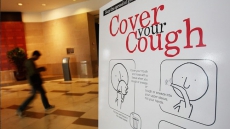TORONTO - A national task force that produces guidelines for doctors says PSA testing should not be used to screen men for possible prostate cancer because it can lead to more harms than benefit.
In guidelines issued Monday, the Canadian Task Force on Preventive Health Care says prostate specific antigen, or PSA, testing is not an effective screening tool because it often produces false-positive results that lead to unnecessary treatments and potentially adverse side-effects.
PSA is a protein produced in the prostate, the walnut-sized small gland located below a man's bladder. Elevated levels of PSA in the blood may indicate the presence of prostate cancer.
"Our recommendation is against PSA screening," said Dr. Neil Bell, who heads the working group on prostate cancer screening for the 14-member task force established by the Public Health Agency of Canada.
"We have a stronger recommendation for men over 69 and under 55, and a little less strong recommendation for men between 55 and 69," said Bell, noting that the advice is based on a review of large international clinical trials that compared outcomes for men who got PSA screening and those who didn't over more than a decade.
The evidence suggests that among men aged 55 to 69, almost one in five had at least one false-positive PSA test, and about 17 per cent ended up with unnecessary biopsies of the prostate as a result, Bell said from Edmonton, where he is a professor of family medicine at the University of Alberta.
Furthermore, more than half of detected prostate cancers are overdiagnosed — meaning they won't cause symptoms or death during a man's lifetime. Such overdiagnosis often leads to treatments that can cause impotence, incontinence, infection and bleeding.
"So what's the benefit in that age group? If you screen men based on the protocol in those trials, every two to four years for 13 years, five out of 1,000 will die from prostate cancer. If you don't screen, six out of 1,000 men will die from prostate cancer," Bell said. "So the reduction in prostate cancer mortality is one in 1,000 or about 0.1 per cent."
"To get the benefit, you're diagnosing about 27 or 28 men with prostate cancer who would never benefit from the treatment related to prostate cancer because they would never suffer any difficulty from it."
"They could be investigated or treated and suffer the consequences of that treatment without actually benefiting from it," he said.
The task force guidelines, published in Monday's edition of the Canadian Medical Association Journal, apply only to using PSA testing to see if a man might have prostate cancer, not for checking whether treatment is working in men already diagnosed with the disease.
But reaction to the task force recommendations that PSA testing be eliminated as a screening tool for prostate cancer was swift and in some cases negative.
The advocacy group Prostate Cancer Canada said it disagrees with the recommendations and insists that when performed appropriately, the benefits of PSA screening far outweigh potential harms.
The organization said that based on new modelling estimates, doing away with regular PSA screening would double the number of advanced cases — in which the malignancy spreads beyond the gland — resulting in an estimated 13 per cent to 20 per cent jump in prostate cancer deaths each year.
"This isn't a black and white issue," said Dr. Stuart Edmonds, vice-president of research, health promotion and survivorship at Prostate Cancer Canada. "You can't abandon testing when there’s research out there that says it’s useful, particularly in the absence of anything better. We believe that when the results are properly interpreted, the benefits of PSA screening outweigh the risks of not screening."
Edmonds said PSA testing should be used as part of "smart screening," a personalized approach in which men are tested to establish a baseline number. Subsequent tests would be performed over time to monitor any changes from that baseline measurement.
In the event of a change in PSA levels, the man and his health-care provider should discuss a course of action based on his personal risk factors, including diagnostic procedures such as a digital rectal exam, biopsy or even an MRI scan, Edmonds said.
"The PSA test is merely the first step in the process to detect prostate cancer in its earliest stages when there are more treatment options," agreed Dr. Laurence Klotz, a urologist at Sunnybrook Health Sciences Centre in Toronto.
"While a single PSA test on its own will not diagnose prostate cancer, it is used as another variable to calculate an individual’s personal risk of prostate cancer and allow for tailored clinical follow-up,” Klotz said in a release. “We need to remove the association of the PSA test as a diagnostic for prostate cancer and instead regard it as a valuable predictor of risk."
Still, Bell said task force members are recommending against routine PSA testing because "we think the harms are sufficiently great ... (and) the majority of men would probably not benefit from that process."
"That being said, men who are concerned about prostate screening should have a discussion with their physician ... to come up with the decision that's appropriate for that person."
"Physicians and patients need to be aware of the fact that in prostate cancer, early diagnosis doesn't always mean you're going to get a better benefit."





